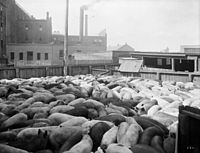
Photo from wikipedia
Abstract. Wild meat has been shown to engender social capital—building and strengthening of social networks and creating cultural pathways for the poor, the urban, and the diaspora to maintain cultural… Click to show full abstract
Abstract. Wild meat has been shown to engender social capital—building and strengthening of social networks and creating cultural pathways for the poor, the urban, and the diaspora to maintain cultural identity. This paper explores wild meat consumption among a very small group of Jamaican Maroons who maintain the declining practice of parrot hunting. Bycatch (incidental take of non-parrot species), particularly pigeons, is often highly valued and consumed together by the group during hunts. The hunters were observed over two hunting seasons, where significant changes to catch yields between one year and the next resulted in a reduction in hunt attendance by young hunters. This transformed group dynamics among the remaining hunters; cohesion relied on the shared consumption of bycatch. Wild meat consumption among the Maroons of Cockpit Country does not build social capital and create social bonds between members of the community and the diaspora. Rather, it accompanies highly specialized practices undertaken by small groups of villagers deep in the forest and is a mechanism through which membership of these groups is determined and maintained. The shared consumption of wild meat, instead, creates symbolic capital, which helps to maintain traditional practice amidst environmental and social change and protects very specific forms of knowledge—including the possible decline of the Black-billed Parrot (Amazona agilis).
Journal Title: Journal of Ethnobiology
Year Published: 2020
Link to full text (if available)
Share on Social Media: Sign Up to like & get
recommendations!